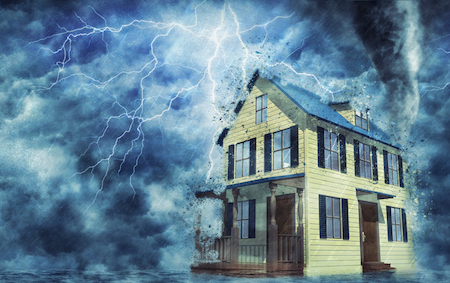Getting in touch with your insurance agent after your home has been destroyed in a fire, hurricane or other natural disaster is likely to be one of the first steps you’ll make after letting your family know you’re safe. Your next call should be to your mortgage lender.
While banks can have a reputation for being hard-nosed when it comes to being paid on time, they don’t want to come off as calloused by foreclosing on someone who lost their home to a hurricane. However, mortgage bills are still due to be paid after a home has been destroyed, whether an insurance company covers the loss or not.
Money can be tight after losing your home in a disaster, and paying your mortgage may be difficult. But unless you’ve lost your job or can’t work for a while, your lender will likely expect your mortgage payment to be paid after a disaster. However, they’re likely to work with you and should be open to deferring payments for a few months, sometimes called a “mortgage holiday” or forbearance—it’s a temporary suspension of payments for a set period.
You may not even have to contact your lender. Banks may be proactive and offer the deferment to you as a sign of good will after your home is destroyed. Your bank will know if your home has been hit by a disaster if a claim is paid by your insurer in a covered loss because the bank controls the payout from the insurance company.
While the insurance settlement check will be payable to both the borrower and the lender, the lender controls the payout until the borrower pays off the loan in full. Any money left can be used to rebuild or buy another property.
Rebuilding can require a building loan for the construction of the new house, and these can have a higher interest rate than a traditional mortgage. Once construction is completed, any remaining debt can be put into a new home mortgage. If the borrower decides to leave, they’ll still own the land on the vacant lot.
The interest clock is still ticking during a mortgage payment delay, which can last for a year or possibly longer. Interest is still being charged during that time, and the deferred interest that accrues will either be added with extra loan payments for that mortgage holiday, or with increased payments during the existing loan. Either way, expect your monthly mortgage to increase after the deferred interest is computed into a new payment.








